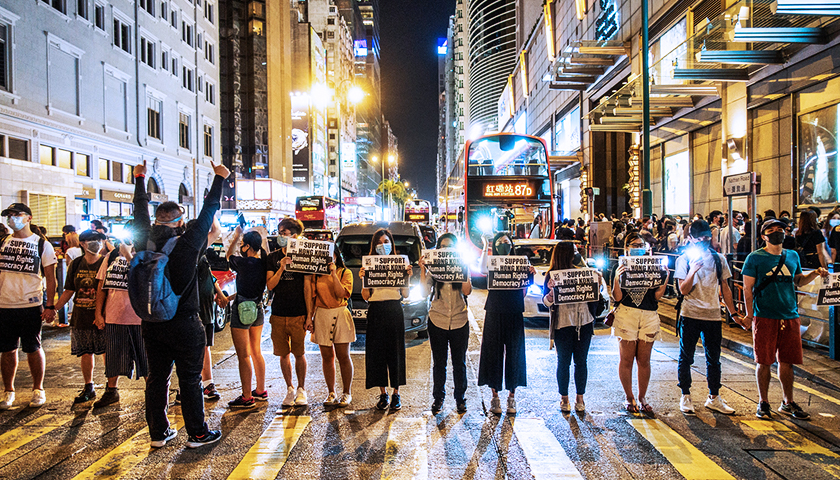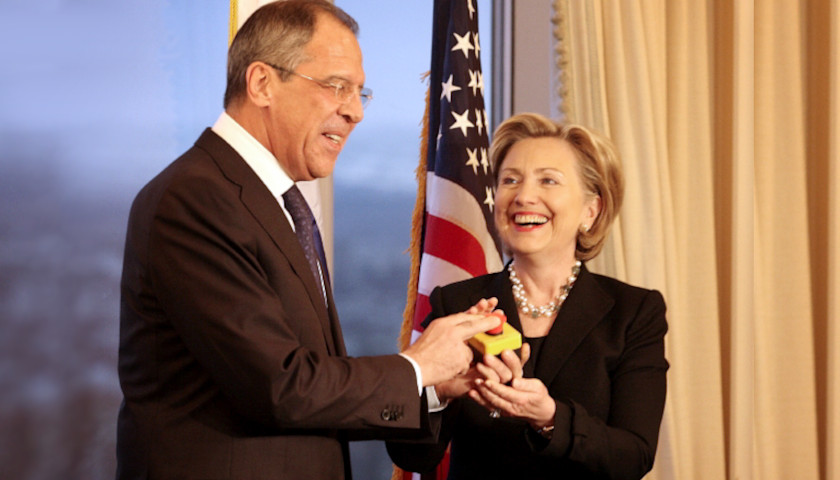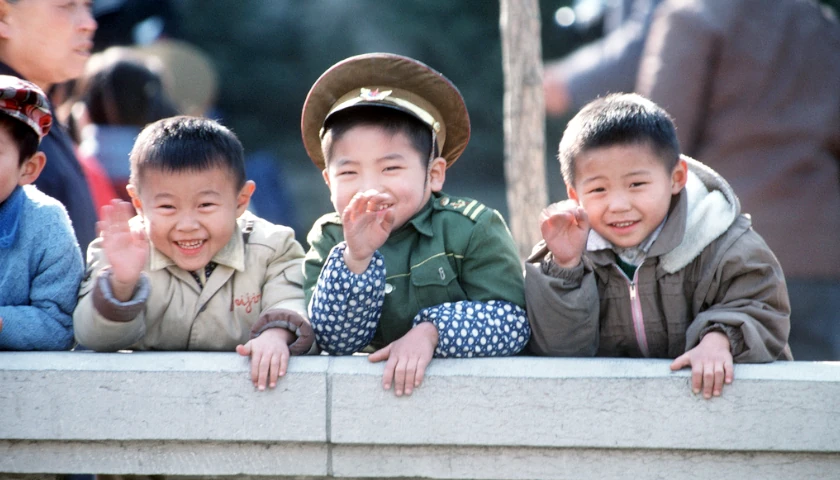by Philip Wegmann
With a reconnaissance plane in tow Thursday, a small fleet of eight fighters deliberately probed disputed airspace before scrambled jets scared them away, an air-to-air episode that may be part of the larger international epoch which President Biden frequently describes as one of “democracy versus autocracy.” But these weren’t Russian fighters. They were Chinese.
The incursion is not unusual; China frequently tests the air defenses of Taiwan. But this minor aggression occurred against a bleak global backdrop: Russian tanks are rolling across Ukraine, and while the United States rallies world opinion against Moscow, China won’t even call it an invasion.
For the moment, however, the White House would rather look past a deepening China-Russia partnership and not connect any dots.
“Are you urging China to help isolate Russia?” a reporter from Reuters asked the president. In the East Room of the White House, Biden replied, “I’m not prepared to comment on that at the moment.” Neither was his press secretary. At least not in any detail.
It was National Security Advisor Jake Sullivan who, unprompted earlier this month, warned Russia that invading Ukraine would lead to U.S. sanctions, necessarily making Moscow more beholden to Beijing for economic relief. So was the Biden administration working with their Chinese counterparts to keep them from lessening the blow of their newly announced financial sanctions?
White House Press Secretary Jen Psaki insisted China was not capable of countering the sum of allied sanctions. All the same, she said Biden was “certainly open” to a conversation with Chinese leader Xi Jinping. Then, for the second time this week, the White House spokeswoman appealed to the better nature of the Chinese communist regime: “This is really a moment for China, for any country, to think about what side of history they want to stand on.”
Across town just hours earlier, Biden’s senior China advisor Laura Rosenberg was publicly criticizing China for its “egregious human rights abuses” against ethnic minorities, a condemnation more in line with how the White House normally views Beijing’s morality.
Thus, it was no surprise when Chinese Foreign Ministry spokesperson Hua Chunying blamed the United States for Russia’s invasion of Ukraine (she objected to the word “invasion”) by “sending weapons to Ukraine” and generally “creating fear and panic.” During the recently concluded Winter Olympics, Vladimir Putin was the rare head of state who traveled to Beijing to watch the games in person amidst widespread diplomatic boycotts over Chinese treatment of Uyghur Muslims. He met with Xi. They released a joint statement saying they “strongly support each other.”
This week marks the 50th anniversary of Richard Nixon’s visit to China, a dramatic presidential trip that normalized relations with the country as part of a larger effort to neutralize Soviet influence in China. Today, though, the Beijing-Moscow axis is tighter than it was during Nixon’s historic visit. “Their relationship seems to be about as close as it’s ever been, going back to Stalin and Mao Zedong,” said Elbridge Colby, a deputy assistant secretary at the Defense Department during the Trump administration. “It’s a very worrisome situation.”
“It can’t be good for Russian interests for Moscow to have no choice but to look to Beijing,” Colby added, in echoing sentiments Sullivan expressed. “But Moscow seems prepared to countenance that, at least for now.”
If China comes to Russia’s economic rescue, would the United States consider inflicting some financial pain on Beijing? “One of the things we will have to watch is the question of whether the U.S. will impose secondary sanctions on China,” said Jacob Stokes, a fellow at the Indo-Pacific Security Program of the Center for a New American Security.
The Trump administration sanctioned the Chinese military in 2018 for purchasing military hardware from Russia, a violation of sweeping American sanctions levied as punishment for the Kremlin’s meddling in the 2016 U.S. presidential election. Similar sanctions, or the threat of them, could potentially scare off the Chinese from coming to Russia’s aid. A former adviser to then Vice President Joe Biden on Asia policy, Stokes said “The play might be: Can you get China to act in a relatively constructive manner, in exchange for some restraint from the U.S. in terms of secondary sanctions?”
Although White House aides would not comment on that possibility, Biden may have subtly hinted at some kind of collateral repercussions for China. “Putin will be a pariah on the international stage,” the president said. “Any nation that countenances Russia’s naked aggression against Ukraine will be stained by association.”
The two spheres are seen as connected, even if tangentially. China may be watching how the West responds to Russian aggression in Ukraine as something of a dress rehearsal for how they might react to a Chinese invasion of neighboring Taiwan.
Biden insists America will remain resolute in its support of Ukraine, and he warned Russia Thursday that “the United States will defend every inch of NATO territory with the full force of American power.” Not everyone believes this is the right emphasis.
“He’s got his priorities reversed,” said Colby. “We have strong interests in Europe, and we need to have a clear and credible strategy for building up NATO’s defenses, but Asia must be our clear first priority because it’s the world’s decisive theater.”
Balancing U.S. interest around the globe is certainly complex. It is also a simple question of resources. “The problem is that we don’t have enough of the key military assets for both a big fight with the Russians and a big fight with the Chinese in even roughly concurrent timeframes,” Colby said. “We thus have to prioritize, and China in Asia has to be the priority. We have to make sure we can.”
But when asked about twin threats from China and Russia, Defense Department spokesman John Kirby replied that the military can handle both theaters concurrently. “I think the gist of your question is, why can’t we walk and chew gum at the same time,” he told reporters in January. “We can, and we are.”
The White House, for the moment, does not want to publicly discuss potential diplomatic moves with China, other than to ask that regime to ponder what side of history they’d like to come down on.
– – –
Philip Wegmann is a reporter for RealClearPolitics.
Photo “Xi Jinping and Vladimir Putin” by Kremlin.ru. CC BY 4.0.






This is the result of the democrats totally inept management of our nation and the failed leadership America has provided globally. It’s almost impossible to not view the last 12 months of mismanagement by the democratic party, and their collection of immoral miscreants in control of our government, as anything but an intentional attempt to destroy our free market economy so the globalist/socialists can reform our Nation as a subset of their great reset.
I challenge any democrat who reads this to explain how anything the Biden administration is doing/has done that can possibly be of benefit to America or the free world!
If the ChiComs decide to ‘take’ Taiwan because of our Pretender Resident’s weakness, then why would the North Koreans not also decide to ‘take’ South Korea. And arguably, things can reasonably get even worse than that! I learned in college a long, long time ago that ‘power abhors a vacuum.’
Looks like stolen Presidential Elections really do have consequences. Democrats, YOU DID THAT! I hope that the American people, and Tennesseans NEVER FORGET!